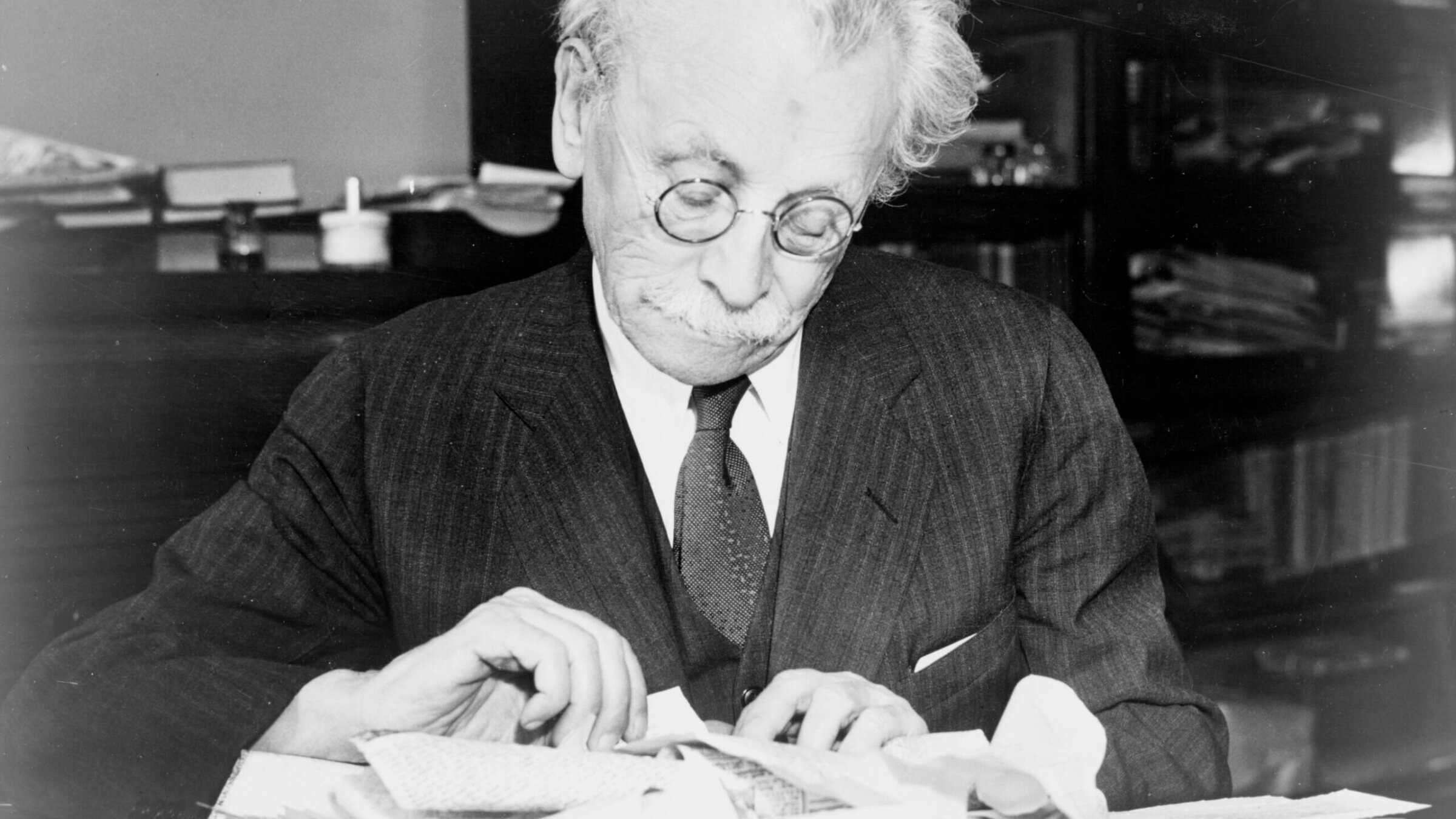Fifth graders write — Why is Abraham Cahan, founder of the Forward, worth celebrating?
Students at Guggenheim Elementary honored Cahan for Jewish American Heritage Month

Abraham Cahan, founder of the Forward. Photo by New York World-Telegram staff photographer/Library of Congress Prints and Photographs Division
Abraham Cahan may have founded the publication you’re currently reading, but as famous Jews in history go, the socialist newspaperman is not exactly A-list.
Students at Guggenheim Elementary in Port Washington, New York, however, are making the case for why the first editor of the Yiddish Forverts deserves more recognition. As part of an activity celebrating Jewish American Heritage month in May, fifth graders at the Long Island elementary school wrote letters to the editor arguing why Cahan is worth celebrating.
Amanda Bromberg and Jenna Kovacs, both former elementary school teachers, Jewish moms and volunteers at the school, created the lesson plan as part of the second annual celebration of Jewish American Heritage month.
Last year, students focused on “bigger names,” Bromberg said, such as Stan Lee, the Jewish Marvel comic book writer, and Ruth Handler, the Jewish entrepreneur who created the Barbie doll.
But this year, Bromberg said she wanted to focus on “a lesser known name, but still someone who did something so important.” Cahan’s relative obscurity and outsize influence made him the ideal pick. Plus, Bromberg thought students would be excited to learn that the Forward is still alive and kicking — in both Yiddish and English.
“When we showed them a screen grab of what the website looks like now and what it looked like when it was all in Yiddish, I think it just made it resonate and made it real for them,” Bromberg said. “They were so excited to learn that their letters weren’t just going in a folder … but it was actually going to be forwarded to an editor.”
Fifth graders read the picture book Amazing Abe: How Abraham Cahan’s Newspaper Gave a Voice to Jewish Immigrants by Norman H. Finkelstein before making their case. (Cahan went by Ab, pronounced “ah-b” like “Bob.” In popular culture, he is often referred to by the Americanized version of his name, “Abe.”)
Some students qualified their responses. “Even though he’s not as famous as Adam Sandler or Ruth Bader Ginsburg,” Jonah wrote, “he definitely deserves to be celebrated.”
“Just like all the other Jews that are more famous than him, he also put a lot of work in to make this country better,” Mae wrote.
Most students focused on Cahan’s work helping Jewish immigrants assimilate to life in the United States. Born in 1860 in modern-day Lithuania, then a part of the Russian Empire, Cahan became involved in Russia’s growing revolutionary movement. After police raided his room in search of radical literature, Cahan fled to the United States, arriving by steamboat at the age of 21. In New York City, he worked in a cigar rolling factory by day, and gave lectures on socialism to fellow immigrants by night. In 1897, he founded the Forward — then a Yiddish-language daily newspaper and a vital resource for Jewish newcomers navigating American life.
“He came to America fleeing from getting caught for rebelling against the Russian government, and still helped a lot of people, even with his struggles,” another fifth-grader, Gloria, wrote.
“He knows how hard it was when he first moved to America, so he put himself in other people’s shoes and helped them when they needed it,” Annie added.
For instance, in 1903, a reader wrote to the Forward asking if he should let his son play baseball, which he thought was a foolish game.
The Forward’s advice? To let the son play, so long as it didn’t interfere with his studies. “Let’s not raise our children to be foreigners in their own country,” the Forward responded.
Advice like that led a student named Giancarlo to put Cahan’s impact succinctly: “Helped others learn stuff like baseball.”
“When he started his newspaper, it was a ‘how to,’” Laila wrote. “He taught them about baseball and handkerchiefs and how to adapt to American life.”
At the same time, students noted how Cahan was proud of his Jewish heritage — and never forgot where he came from.
“He still made people remember their old homes and languages by making newspapers in Yiddish, so people could understand them and learn from them,” Annie wrote.
Students also emphasized the power of the paper in making connections for those in need. They referenced the Forward’s Seeking Relatives column, which helped family members scattered in the aftermath of the Holocaust find one other. Others gave nods to Bintel Brief, the advice column, started by Cahan, still published on our website.
“He brought awareness to a girl who was incredibly ill. Lots of readers donated to her, and it was said he brought a family together, which I found really inspirational,” Isha wrote.
“He gave advice for school, work, how to deal with children, and so much more,” Gloria added.
Other students emphasized the lasting impact of Cahan’s work, perhaps best evidenced by this article in the very publication he founded: “It is amazing how even though this newspaper was made over 100 years ago, it still helps so many people,” Joelle wrote.
Our favorite response also emphasized this legacy.
“You should tell people about Abe Cahan. I mean, come on! He was the founder of the newspaper you’re editing right now! Think of it! If he didn’t create the Forward, you would not be doing your job right now!” Elly wrote. “And Abe helped a lot of people who did not speak English with his paper. And that was enough for them, or as we’d say in Hebrew, dayenu!”
Editor’s note: Student responses were lightly edited for spelling and grammar.

















